Completely irrational animals...
3 April 2024 7:13pm
3 April 2024 9:20pm
4 April 2024 5:05am
Mammal responses to global changes in human activity vary by trophic group and landscape
3 April 2024 4:52pm
These researchers used camera trapping as a lens to view mammal responses to changes in human activity during the COVID-19 pandemic.
Not so silent spectators: How spectator vessels at international sailing regattas alter marine soundscapes
3 April 2024 4:50pm
Check out how water-based sporting events are impacting underwater noise pollution for marine life.
Fonseca Leadership Program
3 April 2024 4:46pm
Rescuers hope AI will help reunite orphaned whale with its family in B.C.
3 April 2024 4:43pm
Finwave, while currently in beta-testing, is being used to help reunite an orphaned whale with its family.
Seventh International Conference on the Effects of Noise on Aquatic Life
3 April 2024 4:34pm
EuropaBON'sFinal Stakeholder Conference
3 April 2024 4:29pm
EcoAssist - Free AI models for camera traps photos identification
3 April 2024 7:16am
Postdoctoral Research Associate in Ecoacoustics
2 April 2024 2:49pm
JWO Research Grant: Biodiversity and Conservation
2 April 2024 2:45pm
WILDLABS AWARDS 2024 - BoutScout: Monitoring System for Avian Nesting Behavior Studies
31 March 2024 5:57am
Blind Spots in Conservation Tech Management in Remote Landscapes: Seeking Your Input
20 March 2024 10:51am
22 March 2024 9:48am
Hi @lucianofoglia
Thanks for sharing your thoughts with the community. What you've touched on resonates with a number of users and developers (looking at you @Rob_Appleby) who share similar concerns and are keen to address these issues.
As a beliver in open sourcing conservation technologies, to mitigate issues you've noted (maintenance of technologies / solutions, repairability, technical assistance to name but a few), really the only way to achieve this in my eyes is through the promotion of openness to enable a wide range of both technical and non-technical users to form the pool of skills needed to react to what you have stated. If they can repair a device, or modify it easily, we can solve the waste issue and promote reusability, but first they need access to achieve this and commerical companies typically shy away from releasing designs to protect against their IP that they keep in house to sell devices / solutions.
I would think for an organisation to achieve the same the community would need to help manufacturers and developers open and share hardware designs, software, repairability guides etc, but the reality today is as you have described.
One interesting conversation is around a kitemark, i.e a stamp of approval similar to the Open Source Hardware Association's OSHWA Certification), but as it's not always hardware related, the kitemark could cover repairability (making enclosure designs open access, or levels of openness to start to address the issue). Have a look at https://certification.oshwa.org/ for more info. I spent some time discussing an Open IoT Kitemark with http://www.designswarm.com/ back in 2020 with similar values as you have described - https://iot.london/openiot/
You may want to talk more about this at the upcoming Conservation Optimism Summit too.
Happy to join you on your journey :)
Alasdair (Arribada)
30 March 2024 3:57pm
Hi @Alasdair
Great to hear from you! Thanks for the comment and for those very useful links (very interesting). And for letting @Rob_Appleby know. I can't wait to hear from her.
Open source is my preference as well. And it's a good idea. But, already developing the tech in house is a step ahead from what would be the basic functional application of an organization that could manage the tech for a whole country/region.
I have witnessed sometime how tech have not added much to the efficiency of local teams but instead being an tool to promote the work of NGOs. And because of that then innovative technologies are not developed much further that a mere donation (from the local team's perspective). But for that tech to prove efficient, a lot more work on the field have to be done after. The help of people with expertise in the front line with lots of time to dedicate to the cause is essential (this proves too expensive for local NGOs and rarely this aspect is consider).
I imagine this is something that needs to come from the side closer to the donors and International NGOs. Ideally only equipment can be lend within a subscription model and not just donated without accountability on how that tech is use. Effectively the resources can be distributed strategically over many projects. Allowing to tech to be repurposed.
Sorry that I step down the technical talk, the thing is that sometimes the simplest things can make the most impact.
It would be good to know if any in the community that have spent considerable time working in conservation in remote regions, and have observed similar trends.
Thanks! Luciano
Postdoc position in Herpetofaunal Ecology & Conservation
30 March 2024 5:57am
CV4E 2025 application deadline extended
29 March 2024 6:28am
Think Wildlife Podcast | The Role of Bioacoustics in Conservation with Bourhan Yassin, Founder of Rainforest Connection
28 March 2024 11:27pm
Hi,
I am Anish and I'm new to this platform! I host the Think Wildlife Podcast and wanted to share a recent episode with Bourhan Yassini. We talk in-depth about the role of AI and bioacoustics in conservation. Tune in to listen more!
ibm-nasa-geospatial (IBM NASA Geospatial)
28 March 2024 9:22am
NASA and IBM have teamed up to create an AI Foundation Model for Earth Observations, using large-scale satellite and remote sensing data, including the Harmonized Landsat and Sentinel-2 (HLS) data.
Early Warning Systems (HWC) - successes/failures, recommendations?
13 December 2023 5:36pm
27 March 2024 3:22pm
Hi @Henrikcox this is very exciting news about the Sentinel. The LoRa and cell options sound really great for a lot of urban/semi-urban areas, so a big potential winner there. Does the Sentinel offer any sort of GPIO pins that could possibly be connected to something external (e.g. like a sound unit that can playback scary sounds) if a detection occurs?
Also @StephODonnell I'd be super keen for something like a 'WILDLABS working group' or similar on this, as it such an important topic.
Rob
27 March 2024 3:45pm
INTERESTING. Okay hold tight on that idea. We've got some events coming on this topic (hence my questions), so a working group could follow on from that?
28 March 2024 7:17am
Hi @Henrikcox
I hope you are well.
I am not sure if you may remember myself and my colleague from CLS. We had a meeting and met in-person at Earthranger last year.
I would be very keen to discuss your current satellite limitations and suggest options based on your required outcome. Please let me know if I can assist?
Applying Open-Source AI to Camera Trap Imagery
27 March 2024 4:34pm
9ICCGIS 2024
27 March 2024 2:28pm
Ai monitoring of wolves in the Netherlands
7 September 2023 9:45am
25 March 2024 5:06pm
26 March 2024 3:13pm
Hi Henrik!
We are going to do tests in the Copenhagen Zoo in Denmark during 2024 and in spring 2025. In the summer of 2025, the plan is to install a system in Northeast Greenland but I am also looking for opportunities to test it at sites with more plar bear action - like in Churchill Manitoba in fall 2025.
The system we started with is based on an NVIDIA Jetson Orin™ NX 16GB module but we are testing it alongside a RaspberryPi 5 based system.
Cheers,
Lars
27 March 2024 1:56pm
Great to know Lars! Let's stay in touch on this, would love to join the testing out there.
Cheers,
Henrik
Announcing the WILDLABS Awards 2024 awardees!
26 March 2024 9:52am
11 April 2024 8:35am
12 April 2024 9:28am
15 April 2024 9:24am
SURAKHSYA Portal for Human-Elephant Conflict - any updates?
25 March 2024 11:15am
25 March 2024 11:39am
Ha - you're already in my thread, i've got your project in there, don't worry!
But it's more I don't want proof of concept early R&D type projects that are just destined for a paper or a hobby project, I want to hear about projects that have some plan for usability and scaling so that other people can take and implement them.
25 March 2024 12:17pm
I think that my system is likely the closest thing you will find in terms of production ready and potential to scale as it once was a commercial system with complete over the air updates more than 10 years ago. It’s been in use by many people for more than 10 years and has used AI triggering since 2019. I’m pretty sure no other system can claim that.
So I have the system but you got me on the scalability because to do that you need funding. I don’t have the funding. If I had the funding I’d be doing it full time. But I’ve said enough now. So I’ll leave it at that.
25 March 2024 12:26pm
This thread is off-topic in this conversation, so happy to continue it in the other one. However, just noting - your system is one example, but not the only one - there are certainly other early warning systems in varying stages of development, testing and roll out, and using different levels of technology (ai or otherwise).
GOSH Community Call: Environmental Sensors / Llamada a la Comunidad de GOSH: Sensores Ambientales
25 March 2024 12:01pm
Apply Now: Women in Conservation Technology Programme, Tanzania 2024
25 March 2024 11:10am
AI for Conservation!
4 March 2024 8:51pm
22 March 2024 12:29pm
Welcome, Have you considered participating in any of the AI for Good challenges. I find it is good way to build a nice portfolio of work. Also contributing to existing open source ML projects such as megadetector or to upstream libraries such as PyTorch is good way to getting hired.
22 March 2024 5:57pm
Thank you for the tip! I'll definitely consider contributing to open source projects and taking part in challenges :)
25 March 2024 5:22am
We could always use more contributors in open source projects. In most open source companies Red Hat, Anaconda, Red Hat and Mozilla, people often ended up getting hired largely due to their contributions on open source projects. These contributions were both technical such as writing computer code and non-technical such as writing documentation and translating tools in their local language.

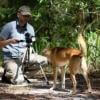


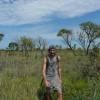


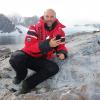
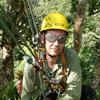



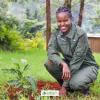







3 April 2024 9:09pm